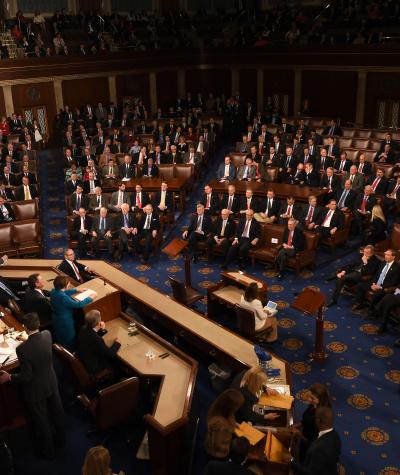In a major victory for democracy, Congress passed the Electoral Count Reform Act of 2022 (ECRA). This vital legislation will update the Electoral Count Act of 1887 (ECA), an archaic law that provides the primary legal framework for casting and counting Electoral College votes in presidential elections.
Congressional passage of the ECRA is crucial and timely. An updated ECA will provide critical new safeguards against election manipulation just as voters are turning their attention to the electoral contests of 2024. While there is still much more work to be done to protect Americans’ freedom to vote, the ECRA should build confidence that the will of the people will prevail in the next presidential election.
When Americans cast their votes for president and vice president, they do so indirectly by voting for their state’s slate of electors. Electors in each state then meet after Election Day to cast their votes in the Electoral College, and those votes are sent to Congress, which counts them to confirm the winner.
For more than a century, the ECA has set a timeline for selecting electors and transmitting their votes to Congress. The ECA also establishes procedures for how Congress counts the electoral votes and the role of the vice president, who presides over this process under the 12th Amendment as the president of the Senate.
However, until now, the original text of the ECA had not been updated since it was first enacted more than 130 years ago. This law was rife with imprecise language, gaps and ambiguities that former President Donald Trump and his allies attempted to exploit as part of an organized effort to overturn the 2020 election.
Although this plan failed, it culminated in the January 6th attack on our country, and these dangerous events drew new attention to the urgent need to update the ECA. That is why, in early 2021, Campaign Legal Center (CLC) convened constitutional experts from across the country and representing all political viewpoints to determine how this law should be modernized.
Since that convening, CLC has worked with our allies over the last two years to help Congress understand and advance at least four key reforms:
- Prohibiting state legislatures from changing the law after Election Day to overrule their voters and the results of the popular election.
- Providing procedures to resolve disputes about electors and election certifications before those disputes reach Congress.
- Strictly limiting opportunities for members of Congress to second-guess states’ certified election results.
- Clarifying the vice president’s ministerial role in the counting of electoral votes and reinforcing that the vice president does not decide election results.
Earlier this year, thanks in part to CLC’s advocacy, a group of bipartisan lawmakers led by Senators Susan Collins (R-ME) and Joe Manchin (D-WV) introduced the ECRA. Subsequently, the U.S. Senate Committee on Rules and Administration held a hearing and a business meeting that demonstrated the widespread consensus among experts and across the political spectrum about how the ECA should be modernized.
In a parallel effort in the House of Representatives, Representatives Zoe Lofgren (D-CA) and Liz Cheney (R-WY) introduced their own update to the ECA – the Presidential Election Reform Act (PERA). This legislation was swiftly brought to the House floor, where lawmakers voted favorably to pass the bill.
Importantly, both the ECRA and the PERA included the four key updates that CLC has supported.
These efforts have now culminated in victory. On Dec. 23, 2022, the U.S. House of Representatives followed the U.S. Senate in passing the ECRA as part of the Consolidated Appropriations Act, 2023, an end-of-the-year omnibus bill containing both government funding and legislative changes across the policy spectrum. This successful vote means that the ECRA, as part of this package, is on its way to the president’s desk to be signed into law.
The lawmakers involved in championing an updated ECA – including Sens. Collins and Manchin, Senate Rules Committee Chairwoman Amy Klobuchar (D-MN) and Ranking Member Roy Blunt (R-MO), Leaders Chuck Schumer (D-NY) and Mitch McConnell (R-KY) and Reps. Lofgren and Cheney – deserve commendation. Thanks to their leadership, a modernized ECA will soon be the law of the land.
The next presidential contest could be one of the most contentious ever. By updating the Electoral Count Act before 2024, Congress has taken a significant step towards making our democracy safer and protecting the will of the voters.
